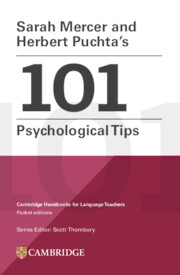Book contents
- Frontmatter
- Contents
- Acknowledgements
- Why We Wrote This Book
- A Psychological Tips for Teacher Wellbeing
- B Psychological Tips for Leading With Compassion, Authority and Skill
- C Psychological Tips for the Socio-Emotional Climate of the Group
- D Psychological Tips for Learner Engagement
- E Psychological Tips for Learner Self-Esteem
- F Psychological tips for Empowering Learners
- Index
D - Psychological Tips for Learner Engagement
Published online by Cambridge University Press: 12 October 2023
- Frontmatter
- Contents
- Acknowledgements
- Why We Wrote This Book
- A Psychological Tips for Teacher Wellbeing
- B Psychological Tips for Leading With Compassion, Authority and Skill
- C Psychological Tips for the Socio-Emotional Climate of the Group
- D Psychological Tips for Learner Engagement
- E Psychological Tips for Learner Self-Esteem
- F Psychological tips for Empowering Learners
- Index
Summary
Learner engagement refers to the degree and quality of learners’ active participation and use of language in class. It is not just about how much they actively do, but how much they do this with heart and mind – having interest in tasks, concentrating and investing effort. Without engagement, learning cannot happen.
60 Engage students through prediction tasks
61 Avoid overloading students with too much new information
62 Plan with motivation in mind
63 Use free flow writing activities
64 Make space for creativity
65 Frame tasks and instructions positively
66 Use stories regularly
67 Increase wait time
68 Explain your rationale for certain tasks
69 Think about the impact of your question format
70 Pair learners to maximize effort
71 Use cold calling but do it with care
72 Pay attention to the attractiveness of materials
73 Unclutter the classroom space
60 Engage students through prediction tasks
Prediction tasks are fun, engaging, and trigger a lot of language use.
Research has established that one of the key competences of the human mind is the ability to make predictions. ‘Minds exist to predict what will happen next. They mine the present for clues they refine with help from the past … to anticipate the immediate future’ (Boyd, 2010, p. 134).
Involving learners regularly in making predictions has several advantages: it is engaging because it gets them to activate schema and think ahead and it awakens curiosity to know if their prediction was correct or not. It also offers multiple opportunities for language use. There is a wide range of ways we can involve students in making predictions:
• Ask them to read a story – but only up to a certain point. Then, working in pairs/groups, they predict what's going to happen next. Optionally, give them six to eight words from the remainder of the story and ask them to use these words in their prediction. Students can also be given the title or plot outlines to predict from. The same task can be done with videos.
• Project a dialogue, line by line. At each line, ask students to predict what the next one might be, then reveal it.
• Search online for famous film lines, e.g., ‘My mama always said, life was like a box of chocolates. You never know what you’re gonna get.’ (Eric Roth, Forrest Gump, 1994).
- Type
- Chapter
- Information
- Sarah Mercer and Herbert Puchta's 101 Psychological Tips , pp. 63 - 77Publisher: Cambridge University PressPrint publication year: 2023



